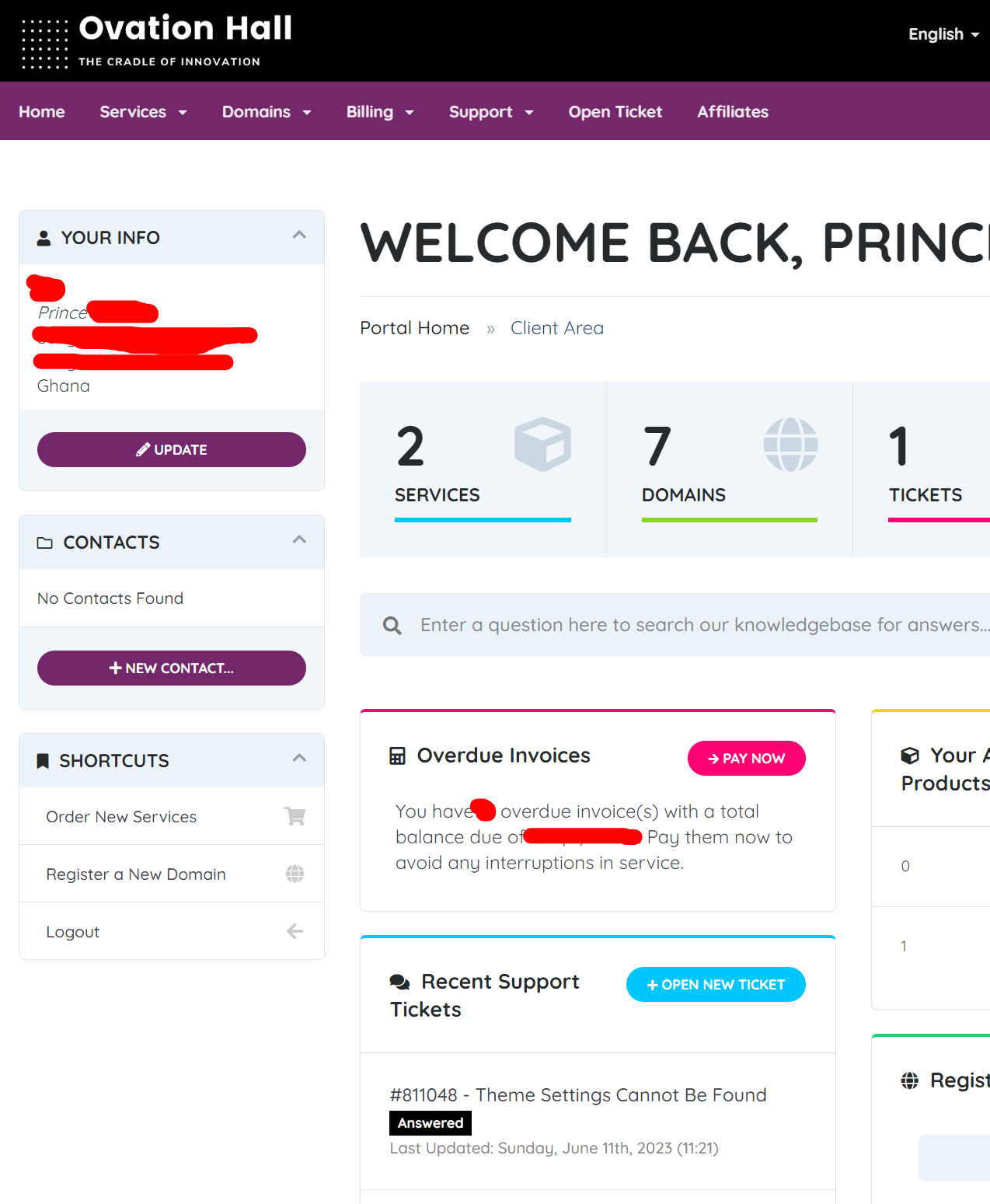GHANA'S BEST WEB HOSTING COMPANY
Try our web hosting risk-free
Get 30 Day Money Back Guarantee on Web Hosting
Experience the transformative power of innovation with Ghana's best web hosting company, where we redefine digital journeys with unparalleled performance, security, and scalability.
We support all major platforms

Set up your web hosting in 3 simple steps
Follow the easy steps below to get your website domain working in less than 15 minutes.
Choose Your Plan
Select the hosting plan that best suits you. You can upgrade later if you want.
Make Payment
Easily complete your purchase with Mobile Money or Bank Card.
Launch Your Website
Upload your content, customize your design, and hit "publish" to make your site live to the world.
Web hosting Pricing Plans
Discover transparent and flexible pricing plans tailored to suit your web hosting needs, ensuring affordability without compromising on quality or features.
Starter
You will need to buy a domain name in addition. Standard domain names cost GH₵179 per year.Silver
Host 5 domains on this package: Get the first domain for free. Save GH₵105 when you order now!Diamond
Host unlimited domains: Get the first one for free. Save GH₵240 when you order now!Technical specifications of web hosting plans
Explore detailed technical specifications of our best web hosting plans, designed to empower your online ventures with robust infrastructure and seamless performance.
Compare our web hosting plans
Transparent pricing for every stage.
Starter
GH₵ 480/year
Silver
GH₵ 735/year
Diamond
GH₵ 960/year
WordPress Availability
Seamless integration for WordPress-powered websites.
MySQL Databases
Robust database support for dynamic content management.
2
10
Unlimited
Unlimited Inode Files
Limit on the number of files permitted.
cPanel Control Panel
Most popular interface for managing hosting settings and features.
Website Builder
A user-friendly tool for creating and customizing websites.
phpMyAdmin
Web-based database management for MySQL databases.
PHP 7.4 and Above
Available versions for server-side scripting language PHP.
99.9% Uptime Guarantee
Assurance of server operational time without interruptions.
DDoS Protection
Defense against Distributed Denial of Service attacks.
Programming & Frameworks (.Net, NodeJS, Laravel, etc)
Support for diverse programming languages and frameworks
Genuine feedback from clients
The best way to showcase our commitment is through the experiences and stories of those who have partnered with us.
At Ovation Hall, prioritizing customer satisfaction is paramount. They consistently demonstrate their commitment through prompt and effective support services. Remarkably, their customer care service sets a standard that others aspire to emulate.
Aaron Laryea
Speed International Bank
It unequivocally stands as the optimal choice for hosting your webpage. With swift response times and unparalleled support, I confidently endorse them as the best web hosting company in Ghana.
George Kwofie
Coxmo Shipping
Ovation Hall has impressed me as a web hosting platform. They are not only very good, but also incredibly responsive. Their quick turnaround on inquiries is a major plus. Additionally, their professionalism and overall approach make them a great company to work with.
Mr. Roland Tetteh
My SKT Podcast
The switch to Ovation Hall has resulted in a demonstrably better user experience for our customers. They now enjoy faster page loads, which is a significant improvement. Consequently, we've been so impressed that we've already recommended their services to two of our clients.
Felix Mensah
There's no doubt that Ovation Hall stands out in Ghana. They offer not only the best domain registration services, but also the best web hosting options available. To top it all off, their customer service is fantastic. Given their exceptional combination of services, Ovation Hall would be my top choice any day of the week.
Avotri Bright
The user-friendly website makes navigating Ovation Hall's services a breeze. What's even more impressive is their responsiveness to emails. Your orders are processed within a few minutes, and you're guaranteed to receive all the support you need – a seamless experience from start to finish.
Godson Afavi
Citizen's Time
Frequently asked questions
Quick answers to questions you may have. Can't find what you're looking for?Give us a call on 0548771088.
Is there a free trial available?
Yes, you can try us for free for 30 days. If you want, we'll provide you with a free 30-minute onboarding call to get you up and running.
Can I change my plan later?
Of course you can! Our pricing scales with your company. Chat to our friendly team to find a solution that works for you as you grow.
What is your cancellation policy?
We understand that things change. You can cancel your plan within 30 days and we'll refund you the difference already paid.
Where are you located in Ghana?
We are located in Ogbojo, near East Legon in Accra. We have team members working remotely across the country and across the world.
Why is Ovation Hall Ghana's best web hosting company?
Ovation Hall is Ghana's best web hosting company in Ghana for these reasons: We provide the fastest NVME SSD servers. We provide both cPanel and Plesk server options. We have been in business for more than 6 years. Therefore we have a lot of experience in fixing your website issues. We are passionate about what we do and we ensure to do it best.
What factors make Ovation Hall stand out as Ghana's best web hosting provider?
Ovation Hall isn't just any web hosting provider – they take pride in offering the best web hosting in Ghana. Tailored to meet the diverse needs of businesses and individuals alike, their services prioritize a range of impressive features. This includes unparalleled uptime guarantees for reliable performance, robust security measures to keep your data safe, and responsive customer support to address any questions promptly. Scalability options ensure your hosting grows alongside your needs, while comprehensive offerings like domain registration and SSL certificates make Ovation Hall a one-stop shop for your online presence. Ultimately, with Ovation Hall, you can rest assured that your website is in capable hands.
What are the advantages of choosing Ovation Hall for web hosting in Ghana over international providers?
Opting for web hosting in Ghana with Ovation Hall offers numerous benefits compared to international providers. Our local presence ensures data sovereignty, adhering to Ghanaian regulations and providing peace of mind regarding data security. Additionally, hosting locally can result in faster website loading times for visitors in Ghana, streamlined communication and support channels, and potential cost savings. Ovation Hall is committed to delivering the best web hosting in Ghana, tailored to the Ghanaian market.
Explore other hosting options available in Ghana
Explore alternative hosting options tailored to your specific needs and preferences, ensuring optimal performance and flexibility for your online endeavors.
cPanel Hosting
- Intuitive control panel for seamless website management.
- User-friendly interface for efficient web hosting administration.
- Robust features for streamlined website customization and optimization.
Plesk Hosting
- Versatile web hosting solution with comprehensive management capabilities.
- Easy-to-use interface for effortless website and server administration.
- Enhanced security features and scalability for growing websites.
WordPress Hosting
- Optimized for WordPress speed, security, and performance.
- Tailored solutions for seamless WordPress website deployment.
- One-click installations and automatic updates for hassle-free management.


